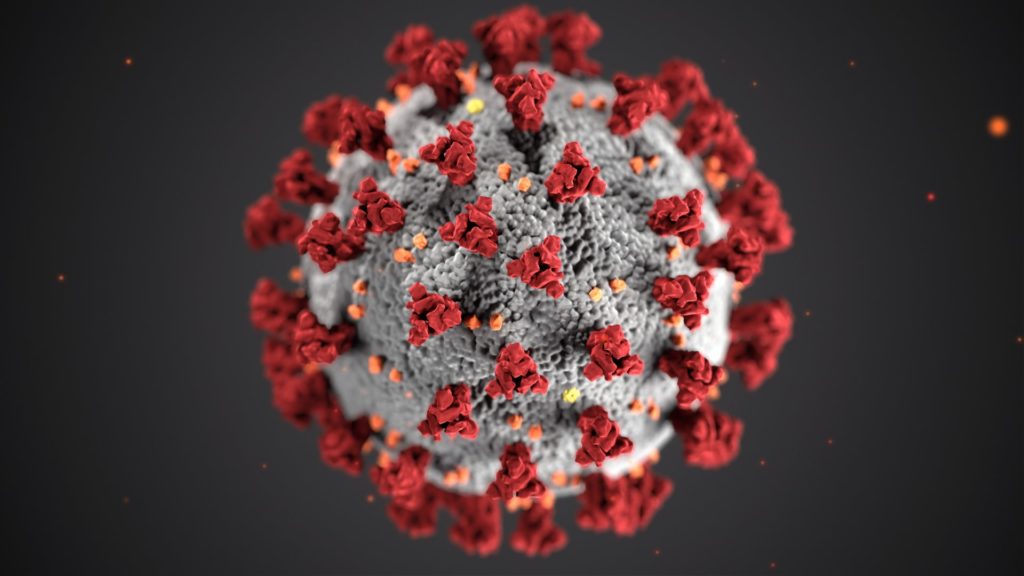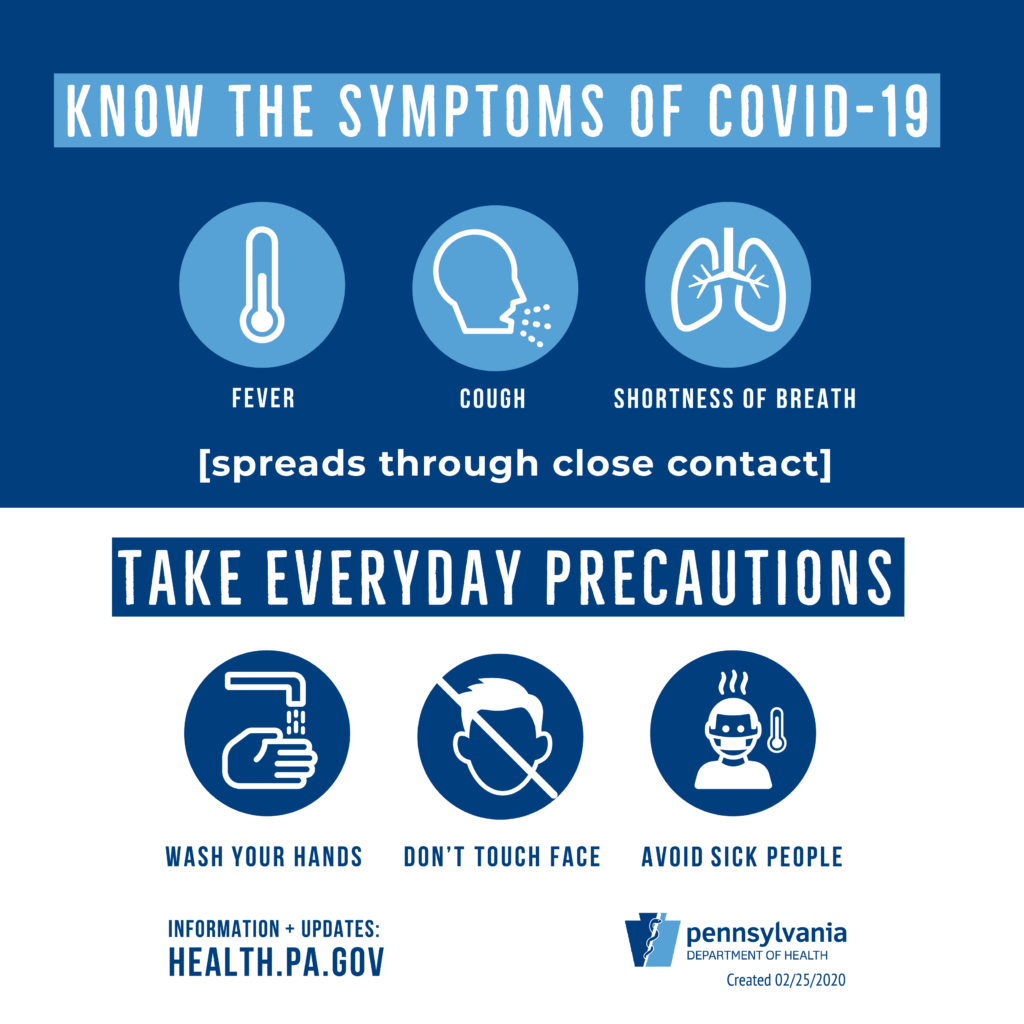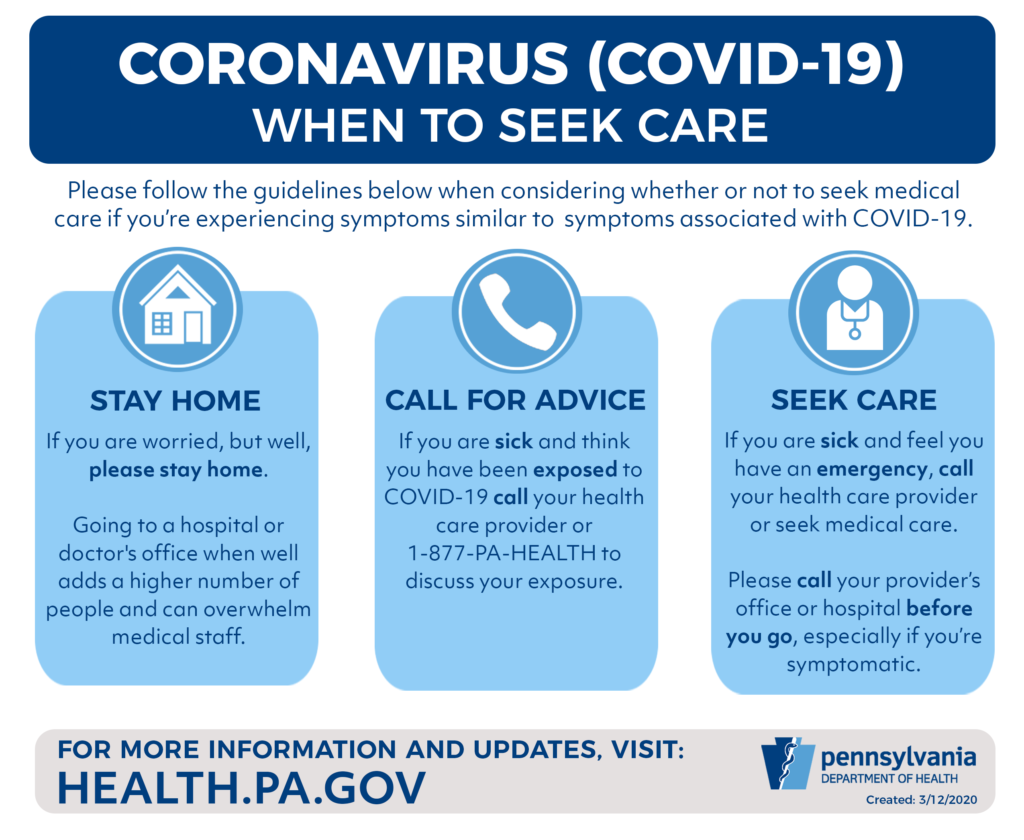The novel coronavirus has started to spread across the United States. As of March 12, 2020, there are 22 cases of the virus in Pennsylvania. This includes two confirmed cases of COVID-19, along with 20 presumptive cases. There are up to 219 people who are currently being observed or investigated for signs of infection or exposure. It is important that people stay informed and stay safe to prevent the spread of the disease and to protect themselves and their families.

According to the Pennsylvania Department of Health, these are the counties that have been affected to date:
- Bucks (2 cases)
- Delaware (1 case)
- Monroe (2 cases)
- Montgomery (13 cases)
- Northampton (1 case)
- Philadelphia (1 case)
- Pike (1 case)
- Wayne (1 case)
These numbers can change from day to day. It is important to listen to health updates from state and local governments to identify problem areas and to contain the spread of the disease.
On March 12, 2020, Governor Tom Wolf held a press conference stating that Montgomery County was considered the epicenter of the cases in Pennsylvania. Governor Wolf also outlined several steps that were being taken to help contain the spread of the disease. Among these actions for Montgomery County are:
- Instituting a “no visitor policy” for correctional facilities and nursing homes, and evaluating whether access to other facilities should be restricted.
- Closing schools in Montgomery County starting March 13, 2020, in addition to all Commonwealth-licensed childcare centers.
- Closing all adult day care centers .
In addition to these restrictions, Governor Wolf requested that people limit non-essential travel. Essential public retails stores, such as supermarkets, gas stations, and pharmacies, will remain open. The Commonwealth asked for non-essential businesses to consider closing.
What is the Coronavirus?
The coronavirus is a type of virus that can cause sickness in humans. Coronaviruses are actually a family of viruses, with many known types. The recent outbreak of coronavirus that is spreading around the world is a new strain of coronavirus. This new strain and its associated infectious disease are known as COVID-19. This strain can cause severe respiratory illness and other symptoms in people.
The specific strain of COVID-19 was not known or recognized prior to December 2019, when it was first documented in Wuhan, China.
A virus is a biological agent, like an organism, that infects cells. A virus infects a healthy cell. It then takes over that cell, using that cell’s systems to produce copies of the virus. This is how viruses reproduce or multiply, as they cannot reproduce on their own. Viruses can badly damage or destroy the cells they infect, which can cause serious health problems for the infected person.
What are the Symptoms of the Coronavirus?
Some of the symptoms of the coronavirus or COVID-19 are similar to those of the flu. These include fever, fatigue, and a dry cough. The symptoms may be mild and then become more severe over time. Some of those infected may develop a wider range of symptoms. These additional symptoms can include congestion, soreness or aches, a sore throat, runny nose, or diarrhea.
Certain people can be infected but may not show any symptoms. It is not entirely certain if a person who has the virus but who is not showing any symptoms can infect others. It is believed that people are more contagious when they are showing the more serious symptoms, such as coughing, but this is still under investigation. To be safe, people should assume that even a person with minor symptoms may be contagious and follow rigorous cleaning methods and limit physical contact.
The majority of cases of COVID-19 do not require special treatment. It is estimated by the World Health Organization that approximately 80% of people infected recover without significant treatment. However, there are certain groups in the population that are more at risk of developing serious health problems. These groups include the elderly and people who already have health problems. People suffering from pre-existing medical conditions like heart disease, diabetes, asthma, cancer, or a compromised immune system are at greater risk from COVID-19.
Approximately 1 in 6 people who contract COVID-19 are seriously affected and have difficulty breathing.
How Does the Coronavirus Spread?
It is believed the coronavirus spreads through physical contact. This can include droplets that are exhaled when an infected person coughs. The droplets can be inhaled by others in the immediate area. A person may also be infected if they touch a surface on which the droplets have fallen and then proceed to tough their face, mouth or other areas.
A person may also come into physical contact with the virus when they shake hands or have direct physical contact with an infected person.
How to Protect Yourself from the Coronavirus
There are certain actions that you can take to protect yourself from the coronavirus. It must be said that these are steps that should be followed at any time, not just in the face of a potential pandemic. These actions include:
- Washing your hands – routinely wash your hands with warm, soapy water. Washing your hands with soap is one of the best protections against viruses. To be effective you should wash your hands with soapy water for at least 20 seconds.
- Use an alcohol-based hand sanitizer – if you do not have soap and water to use, then an alcohol-based hand sanitizer may help in damaging or killing viruses. In order to be effective the hand sanitizer should be at least 60% alcohol. However, using alcohol-based hand sanitizer is not considered as effective as soap and water in protecting against viruses and germs.
- Clean surfaces and items regularly– use an alcohol-based cleaner or other cleaner that can kill viruses to clean surfaces or items that are often shared. Common surfaces and things that will need cleaning include doorknobs, light switches, countertops, tables, cell phones, remote controls, and other items that are commonly touched by multiple people.
- Self-quarantine if you have symptoms – if you do not feel well and are showing symptoms it is best to avoid going out in public. Stay home, get rest, and seek medical attention if your symptoms worsen. Staying home will help prevent you from infecting others in the event you are suffering from COVID-19.
- Limit physical contact with others – maintain a safe distance between yourself and others if you must go out in public. Avoid touching surfaces that have not been cleaned, stay at least one meter (or at least one yard) away from others, or more if they are showing symptoms.
- Avoid touching your face or mouth – one of the ways to avoid contracting the virus is to avoid touching your face or mouth. This can help prevent the transmission of the virus.
- Avoid coughing or sneezing into your hands – cover a cough or sneeze with your elbow. Do not cough or sneeze into your hands. This can help spread the virus if you have contracted it.
While these recommendations are not foolproof, they can help protect you against the virus.

Also, most health agencies have said that people who are not showing symptoms of sickness should not use face masks. Face masks should be used only for those showing symptoms who have been diagnosed with COVID-19 or for those who are directly treating people with symptoms, such as healthcare workers or those directly caring for the infected.
Can I Take Antibiotics to Treat the Coronavirus?
No. Antibiotics are only effective against bacterial infections. Bacteria are different from viruses. The coronavirus cannot be treated with antibiotics.
Is There a Vaccine for the Coronavirus?
Not at this time. There are no vaccines for COVID-19, although researchers are working on developing vaccines. However, that will take time. There are also no antiviral medications that are known to be effective against COVID-19 at the moment.
However, people suffering from symptoms should still seek medical treatment. There may be other treatments that may help combat certain symptoms, including respiratory distress. When in doubt, contact a physician.
Resources for Coronavirus Information
Here are a list of resources that people can access for up-to-date information about the outbreak of COVID-19 and the coronavirus, both locally, nationally, and globally:

The Pennsylvania Department of Health – Coronavirus Page
The City of Philadephia – Coronavirus Page
Montgomery County – Coronavirus Page
Categories
- Bicycle Accidents
- Brain Injuries
- Burn Injuries
- Bus Accidents
- Car Accidents
- Construction Accidents
- COVID-19
- Dog Bites
- Drunk Driving
- Injury Insurance
- Medical Malpractice
- Motorcycle Accidents
- Pain and Suffering
- Pedestrian Accidents
- Personal Injury
- Premises Liability
- Product Liability
- Rideshare Accidents
- Slip and Fall
- Truck Accidents
- Worker's Compensation
- Wrongful Death
Recent Posts
- What Does a Blinking Red Light Mean in Traffic?
- How Much is the Average SEPTA Bus Accident Settlement in Philadelphia?
- How Much is the Average Dog Bite Injury Settlement in Pennsylvania?
- How to Prove Negligence in Your PA Personal Injury Claim
- What Is the Statute of Limitations in Pennsylvania for Personal Injury Claims?



